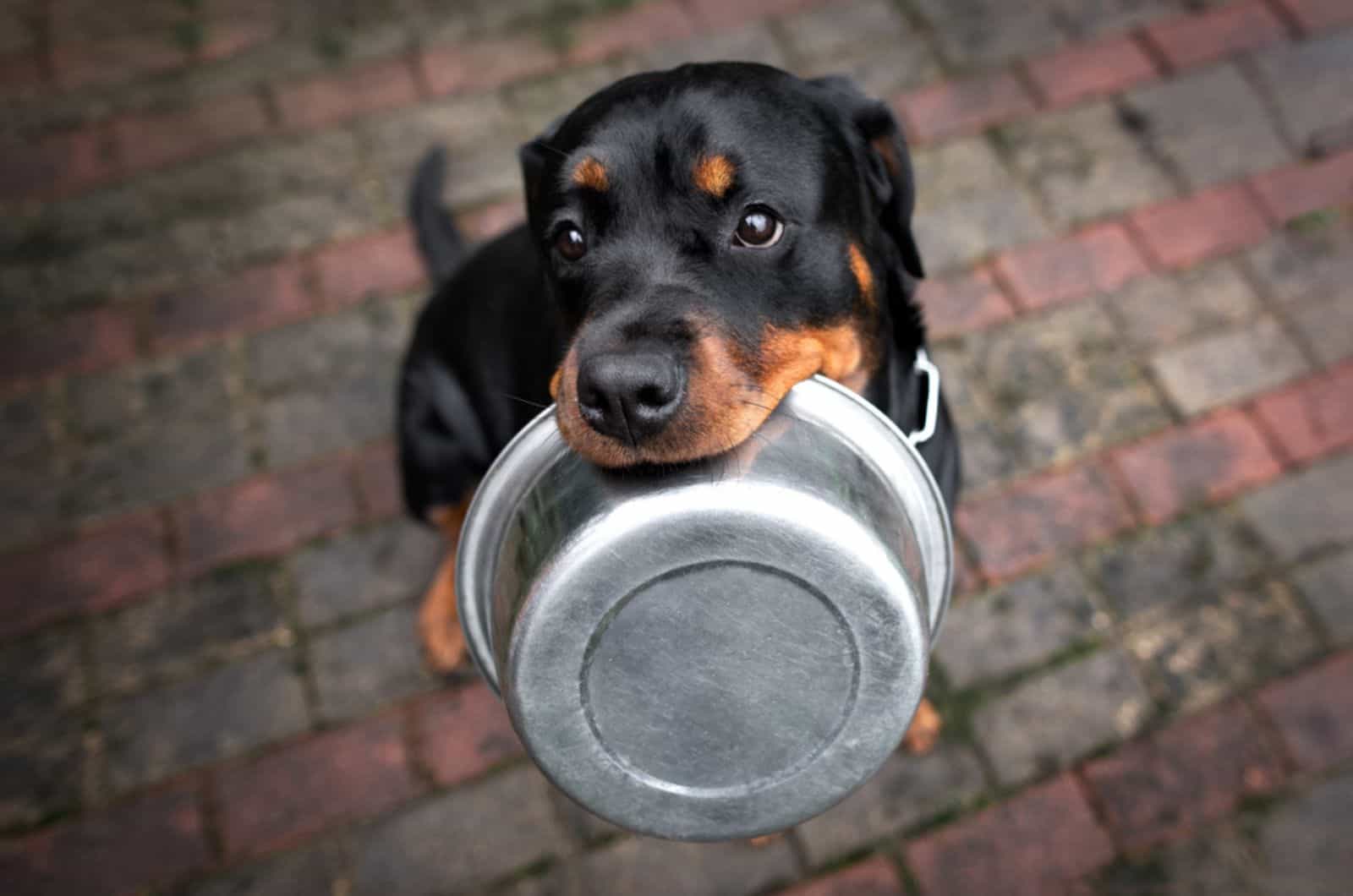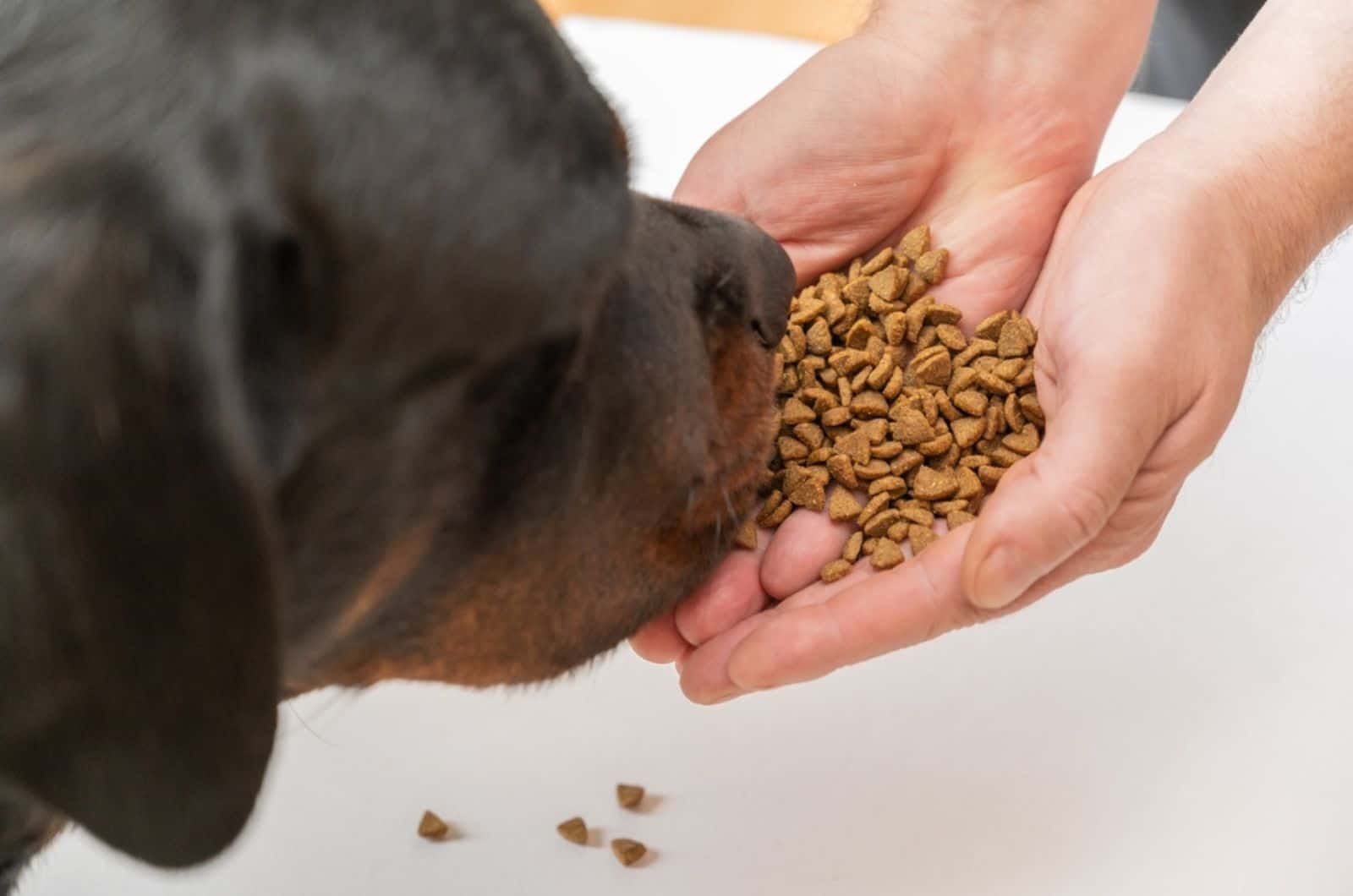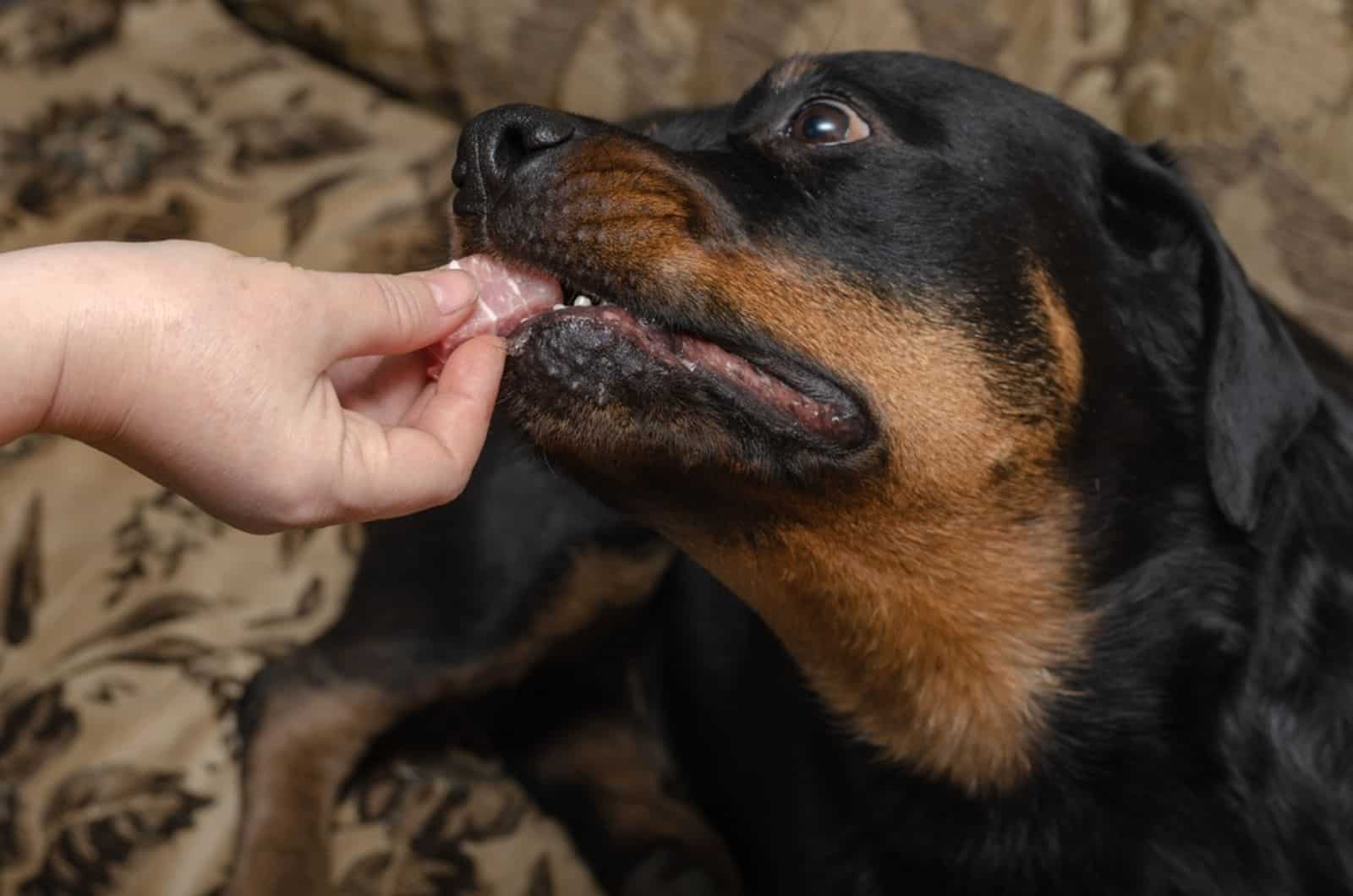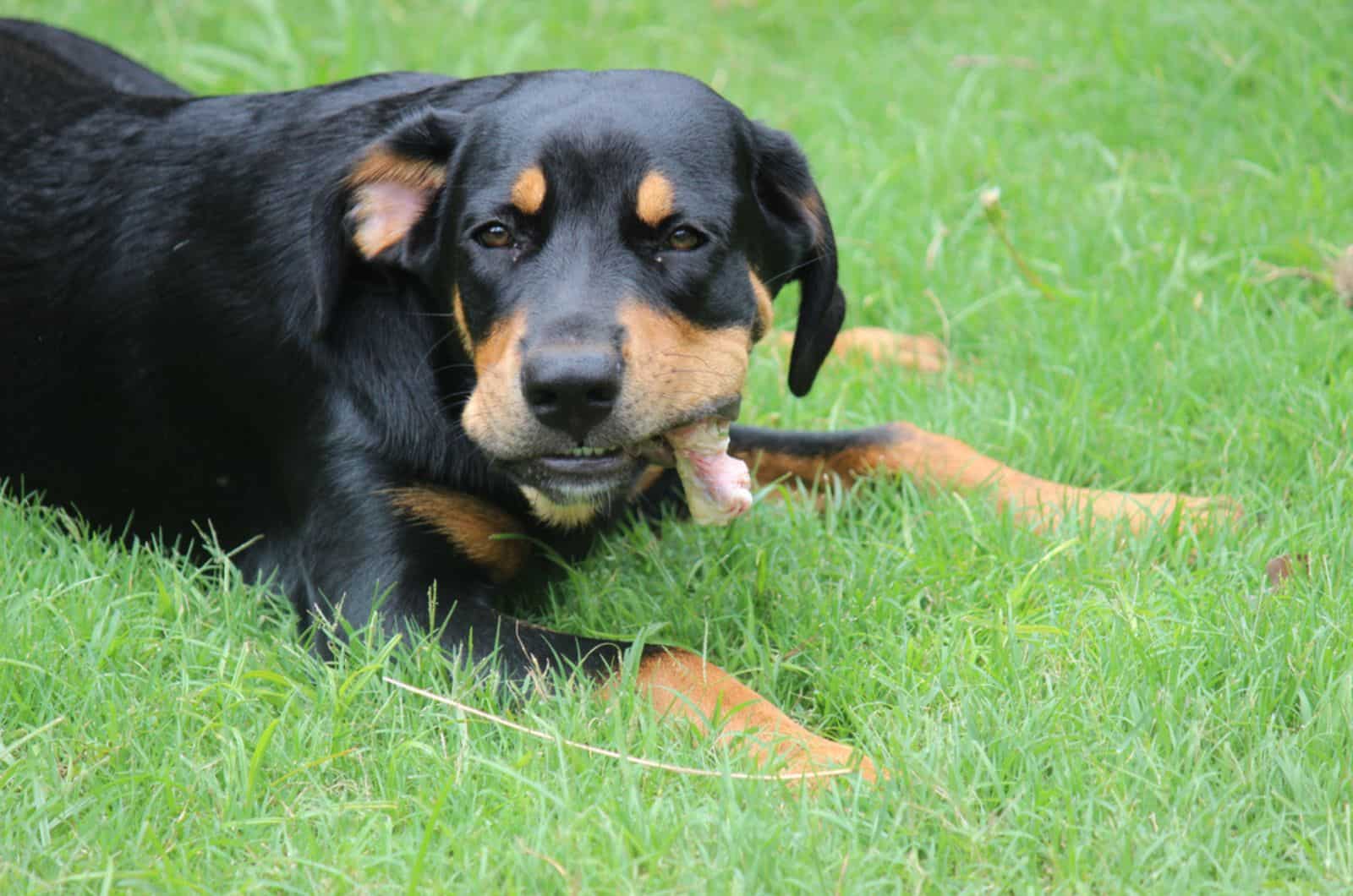“Why is my Rottweiler always hungry?” is a question that many Rottweiler owners may find themselves asking. A dog’s excessive hunger can be caused by a variety of factors, including medical conditions, feeding and diet-related issues, and behavioral problems.
Understanding the underlying cause of your Rottweiler’s excessive hunger is crucial in addressing the issue and ensuring the health and well-being of your furry friend.
In this Pupvine article, we will explore the various causes of excessive hunger in Rottweilers and provide tips on how to address the issue.
Remember, excessive hunger can be a sign of an underlying medical or behavioral issue and should not be ignored.
So, if you’re one of those people who have been asking themselves “why is my Rottweiler always hungry?” then keep reading to find the answers that you are looking for.
Why Is My Rottweiler Always Hungry — Possible Causes

As we said, in this article, we will explore the various causes of excessive hunger in Rottweilers and provide tips on how to address the issue.
We will start by discussing medical causes, such as diabetes and thyroid issues, and provide insight into how these conditions can affect a dog’s appetite.
Then we will move on to feeding and diet-related causes, providing tips for creating a balanced diet for Rottweilers.
Finally, we will delve into behavioral causes of excessive hunger and provide strategies for addressing these issues.
Figuring out what is causing your Rottie to be hungry all the time is the first step to solving that problem, so it’s not something that should be taken lightly.
Health Issues
Dog health and diet are intrinsically linked, and excessive hunger in Rottweilers can be caused by various medical conditions.
Some of the most common medical conditions that can lead to excessive hunger in dogs are listed below, but it’s important to note that these are just a few examples. There are many other medical conditions that can cause a dog to be always hungry.
It’s always a good idea to consult a veterinarian to rule out any underlying medical issues. Your vet will perform a thorough examination to identify the underlying cause, and then they can provide appropriate treatment.
Related: Why Is My Rottweiler Not Eating? 11 Reasons For This Behavior
Cushing’s Disease
Cushing’s disease is a hormonal disorder that results in the overproduction of cortisol. Dogs with Cushing’s disease may experience an increase in appetite due to hormonal imbalance.
Cushing’s disease is typically caused by a tumor on the pituitary gland or the adrenal gland, and can be treated with medications.
Other common warning signs of this illness include increased thirst, excessive urination, and panting.
Intestinal Parasites
Intestinal parasites can cause a number of symptoms in dogs, including excessive hunger. In some cases, intestinal parasites can cause malabsorption of nutrients leading to an increase in appetite as the dog’s body tries to compensate for the lack of nutrition.
Additionally, intestinal parasites and bacterial overgrowth can cause inflammation in the intestine which can lead to discomfort and an increase in appetite. Common intestinal parasites that can affect Rottweilers include roundworms, hookworms, whipworms, tapeworms, and giardia.
These parasites can be contracted from contaminated soil or dog food, or from contact with infected animals.
The symptoms of intestinal parasites can vary depending on the type and severity of the infection and can include diarrhea, vomiting, weight loss, and a pot-bellied appearance.
Diabetes
Diabetes is a metabolic disorder that results in high blood sugar levels. Dogs with diabetes may experience an increase in appetite as their body tries to compensate for the lack of insulin.
The lack of insulin causes the dog’s body to break down fat and muscle for energy, leading to weight loss and an increase in appetite.
Besides increased hunger, there are other symptoms, such as unusually high thirst, frequent urination, and noticeable weight loss.
Diabetes is a serious, and potentially fatal, condition and requires lifelong management through diet, exercise, and insulin therapy. You can expect your vet bills to pile up.
Hypothyroidism
Hypothyroidism is a condition in which the thyroid gland doesn’t produce enough hormones. Dogs that are affected by this condition frequently experience a decrease in appetite due to hormonal imbalances in these glands.
Hypothyroidism is usually caused by an autoimmune disorder and can be treated with hormone replacement therapy, which typically involves taking a daily pill that contains synthetic thyroid hormone
Other associated symptoms of hypothyroidism include weight gain, hair loss, and lethargy.
Nutrition-Related Issues

Feeding and diet can also play a role in excessive hunger in Rottweilers.
Keep in mind that Rottweilers are large dogs and have different nutritional needs than small dog breeds such as Shih Tzus, for example. It is important to provide them with a diet that is specifically formulated for their size and activity level.
Consult with a veterinarian or a professional canine nutritionist to create a balanced diet for your Rottweiler, including the recommended daily caloric intake, and the right balance of protein, fat, and carbohydrates.
You should also pay more attention to the type of treats you are giving them.
What To Feed A Rottweiler
Feeding your Rottweiler a diet that is not balanced or does not meet their nutritional needs can lead to excessive hunger.
Rottweilers need a diet that is high in protein and fat, but low in carbohydrates and fillers. Whether it’s kibble or wet food, feeding your Rottie a diet that is high in carbohydrates can lead to weight gain and an increase in appetite.
Also, it is important to avoid feeding them table scraps or human food as they may be lacking the essential nutrients that they need.
There is also the option of raw feeding, but that’s a whole other story.
How Much To Feed A Rottweiler
If you’re feeding your Rottie too little, it may be hungry all the time. On the other hand, if you’re overfeeding, it may have a decreased appetite due to feeling full all the time.
You should always try to determine the appropriate amount of food for your Rottweiler based on their age, weight, and activity level. Food is a limited resource and you should use it wisely. Use a Rottweiler feeding chart or consult a professional to help you out.
Additionally, feeding your Rottweiler at irregular intervals can lead to excessive hunger. Dogs thrive on routine and predictability, and feeding them at regular mealtimes can help regulate their appetite.
Behavior-Related Issues
In addition to medical and feeding-related causes, certain behavioral issues can also lead to excessive hunger in Rottweilers.
To address these behavioral causes of excessive hunger, it is important to provide your Rottweiler with plenty of physical and mental stimulation.
This can include regular exercise, training, and interactive toys. It is also important to address any underlying anxiety or stressors that may be contributing to your Rottweiler’s excessive hunger.
Anxiety And Stress
Dogs that are anxious or stressed may eat more than usual as a way to cope with their emotional state. Signs of anxiety in Rottweilers can include restlessness, panting, and destructive behavior.
If you suspect that your Rottweiler is anxious, try to identify the cause of its anxiety and remove it or provide them with coping mechanisms.
Additionally, it is important to avoid using food as a reward or a way to cope with stress, and instead use positive reinforcement techniques such as praise, petting, and playtime.
Lack Of Stimulation
When dogs are not getting enough physical and mental stimulation, they may become bored and turn to food as a form of entertainment. This can lead to excessive eating and an increased appetite.
Rottweilers are large and active dogs, they have a lot of energy and need to expend it through regular exercise and activities. Without enough stimulation, they can become bored and anxious, which can lead to destructive behavior and an increase in appetite.
A lack of stimulation can also lead to other behavioral issues such as destructive behavior, excessive barking, and restlessness. To prevent this, it is important to provide your Rottweiler with plenty of physical and mental stimulation on a daily basis.
This can include regular exercise, training, interactive toys, and playtime. So get the leash out and take your Rottie out for a walk!
Why Is My Rottweiler Always Hungry — Other Potential Factors

Aside from the three main categories of potential causes that we have already listed (i.e. medical, nutritional, and behavioral), there are also some other factors that could be at play.
The causality behind your Rottie’s increased hunger is probably not straightforward and there is typically a complex web of influences that are causing it to be a hungry dog all the time.
Keep reading to learn about some additional factors that could be behind it.
The Role Of Genetics
Some Rottweilers may be predisposed to excessive hunger due to their genetic makeup.
Certain breeds, including Rottweilers, may have a genetic predisposition towards obesity and food-seeking behavior. This can make it harder for these dogs to maintain a healthy weight and can lead to excessive hunger.
This genetic predisposition can be influenced by a number of factors, including the dog’s metabolism, hormone levels, and appetite-regulating mechanisms.
Some Rottweilers may have a slower metabolism, which can make it harder for them to burn off calories, leading to weight gain and an increased appetite.
The Impact Of Spaying And Neutering
Neutering or spaying can affect appetite in Rottweilers. These procedures can cause changes in hormone levels that can affect metabolism and appetite.
Plenty of dogs may experience an increase in appetite and behavior after neutering or spaying, which can lead to weight gain if not managed properly.
To manage this, you can consult with a veterinarian or a professional nutritionist to determine the appropriate diet and exercise plan for your Rottweiler based on its new hormone levels.
Supplements And Probiotics
Supplements and probiotics can be beneficial in managing hunger in Rottweilers.
Probiotics are beneficial bacteria that can help maintain the balance of the gut microbiome, which can in turn help regulate appetite. Some probiotics may also help to improve nutrient absorption, which can help to decrease hunger.
Supplements like omega-3 fatty acids and fiber can also help to manage hunger. Omega-3 fatty acids can help to decrease inflammation in the body, which can help to regulate appetite. Fiber can also help to regulate appetite by making the dog feel full for longer periods.
It’s important to note that supplements and probiotics should only be given to your Rottweiler under the guidance of a veterinarian or a professional nutritionist, as some may interact with certain medications or have certain side effects.
Additionally, it’s important to make sure that the supplements and probiotics you give to your Rottweiler are of good quality and are appropriate for your dog’s needs.
Other Environmental Factors
Environmental factors such as temperature, humidity, and stress can affect hunger in Rottweilers.
For example, high temperatures and humidity can cause dogs to feel sluggish and less active, which can lead to a decrease in appetite.
Rottweilers also have thick coats and may feel uncomfortable in hot weather, which can also affect their appetite. It’s important to keep your Rottweiler in a cool and comfortable environment and to provide it with plenty of water to keep them hydrated.
It’s also important to address any sources of stress in your Rottweiler’s environment, such as loud noises, unfamiliar animals, or changes in their routine. Providing them with a calm and predictable environment can help to reduce stress and promote a healthy appetite.
Conclusion
Excessive hunger in Rottweilers can be caused by a variety of factors, including medical conditions, feeding and diet-related issues, and behavioral problems. Therefore, answering the question “why is my Rottweiler always hungry?” is a slightly complicated task.
Medical conditions such as diabetes, Cushing’s disease, and hypothyroidism can lead to excessive hunger in Rottweilers, as well as other issues related to the dog’s diet.
Certain behavioral issues, such as anxiety, boredom, and learned behavior, can also lead to your Rotty being a bit too hungry a bit too often.
While this article provides some insight into these causes, as well as some useful tips on how to address them, we still recommend that you consult a veterinarian to rule out any underlying medical issues.
By understanding the underlying causes of excessive hunger, you can help ensure the health and well-being of your Rottweiler.
Read next: 19 Best Dog Foods For Rottweilers + Nutritional Needs Guide
